Did you find this article helpful for what you want to achieve, learn, or to expand your possibilities? Share your feelings with our editorial team.
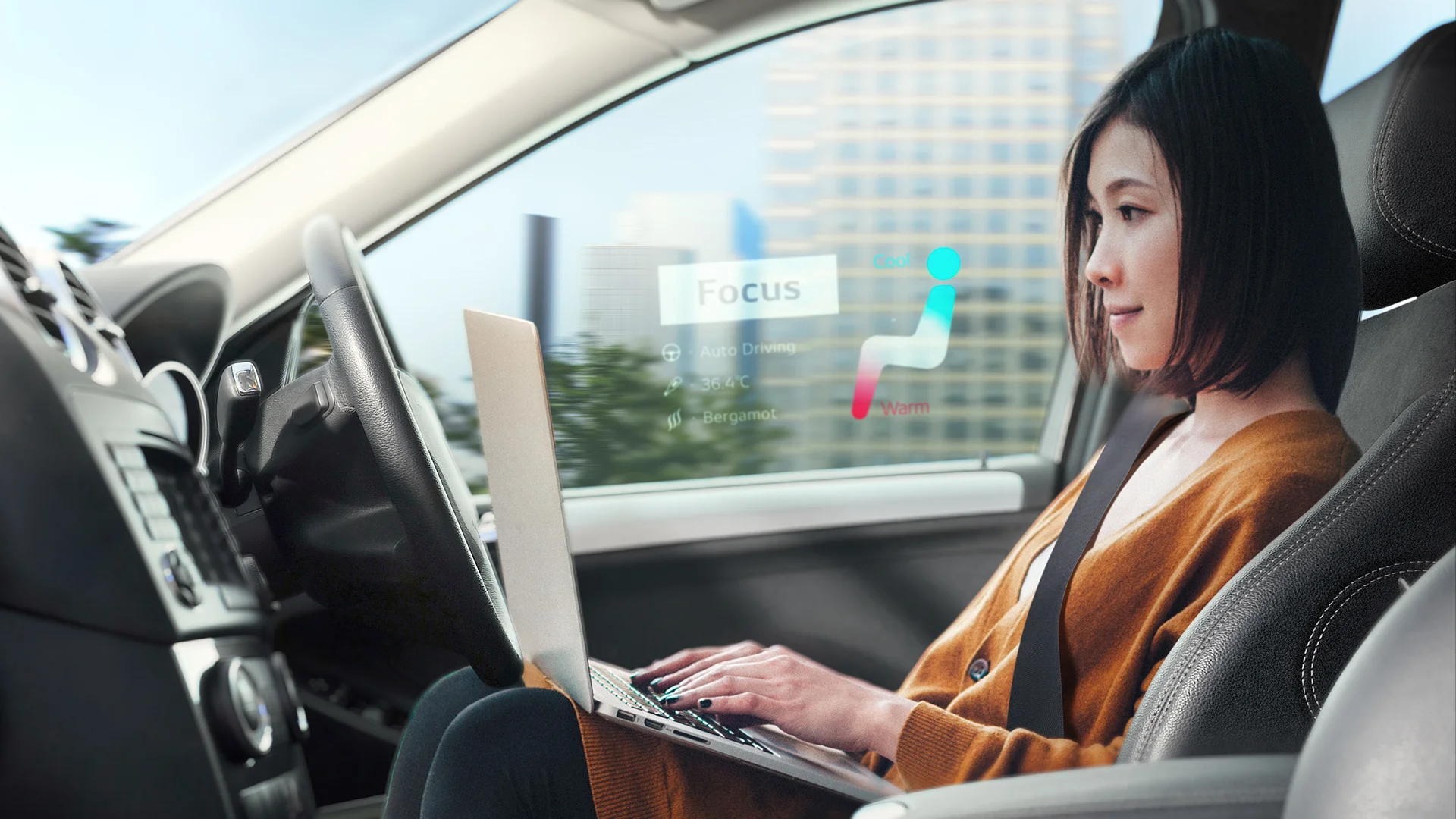

Jan 29, 2021
VISION & IDEAWhat would you do if you had your mobility space all to yourself?
Here are three ways for you to enjoy more freedom within the car cabin.
Today, cars are considered a mode of traveling from your point of origin to certain destinations. But we believe that soon riding a car will be a purpose in itself. Creating a unique value as a private mobility space or a “4th Place”, the future car cabin is expected to offer passengers a mobility experience that is freer than ever before. What would you do if you could spend your time in transit doing something other than driving?
Contents of this article
Will cars become comfortable, versatile spaces?
An office is a place to work, a classroom is a place to study, a platform at the station is one of the transit points to a destination, and a hotel is a place for you to enjoy rest and relaxation. Each space has a purpose, and people associate certain activities with a place depending on that purpose. In recent years, however, the concept of a space and the role that it plays has come to mean a variety of things, in addition its conventional role. This means that an office can be an event site, a station platform can be a pub, and a hotel room can become an office during a working holiday. We can say that the ideas we associate with spaces are becoming more flexible.
The global COVID-19 pandemic of 2020 has had a tremendous impact on our lives, causing many of us to re-evaluate our values, work schedules, and lifestyles. Changes to our routine have also caused us to redefine our use of spaces, including our mobility space, which we believe will continue to become more diverse.
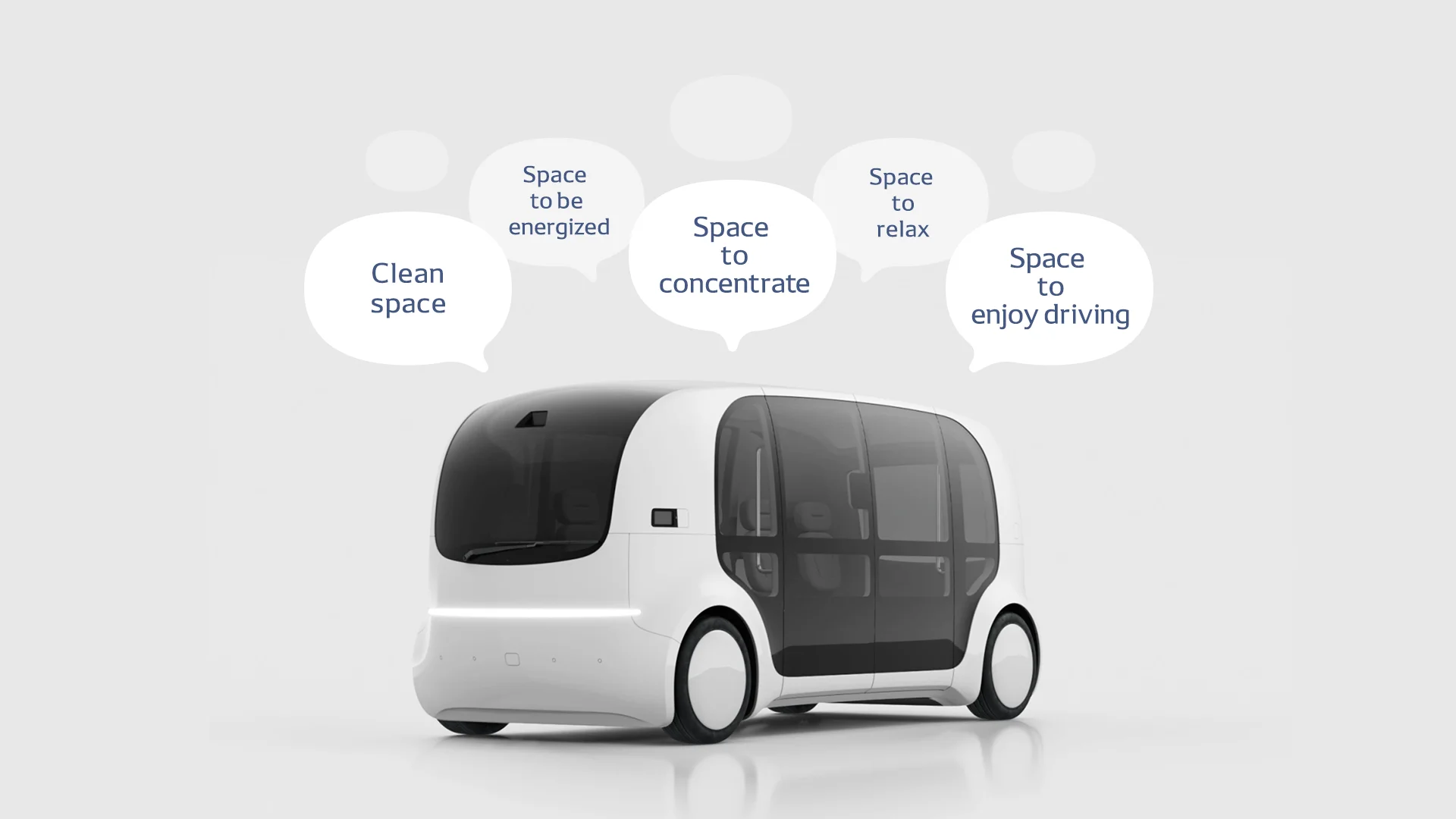
The values and conditions that each person seeks in a mobility space are different. Here are a few examples:
-
I've always commuted on crowded trains, but the spread of COVID-19 has made me anxious about commuting to work by train with a large number of people. What I expect the most in the mobility space is safety.
-
I feel tired these days, so I feel anxious to drive a long distance by myself. My wife is also busy with work, and I want to let her sleep in the car on the way, so I can't play music with loud sounds. Is there a good way to help me stay alert while not interfering with my wife's sleep?
-
Before leaving for a trip, I always research the history of the destination, the shops I would like to visit, and so on, but I tend to forget about them while driving to the destination. Also, I get nervous driving in an unfamiliar place. Having a guide would make me feel more secure while traveling.
What is needed to meet these diverse needs is not a specific function, but flexibility that fits each individual’s needs.
With mobile private spaces, cars can be our “4th Place”
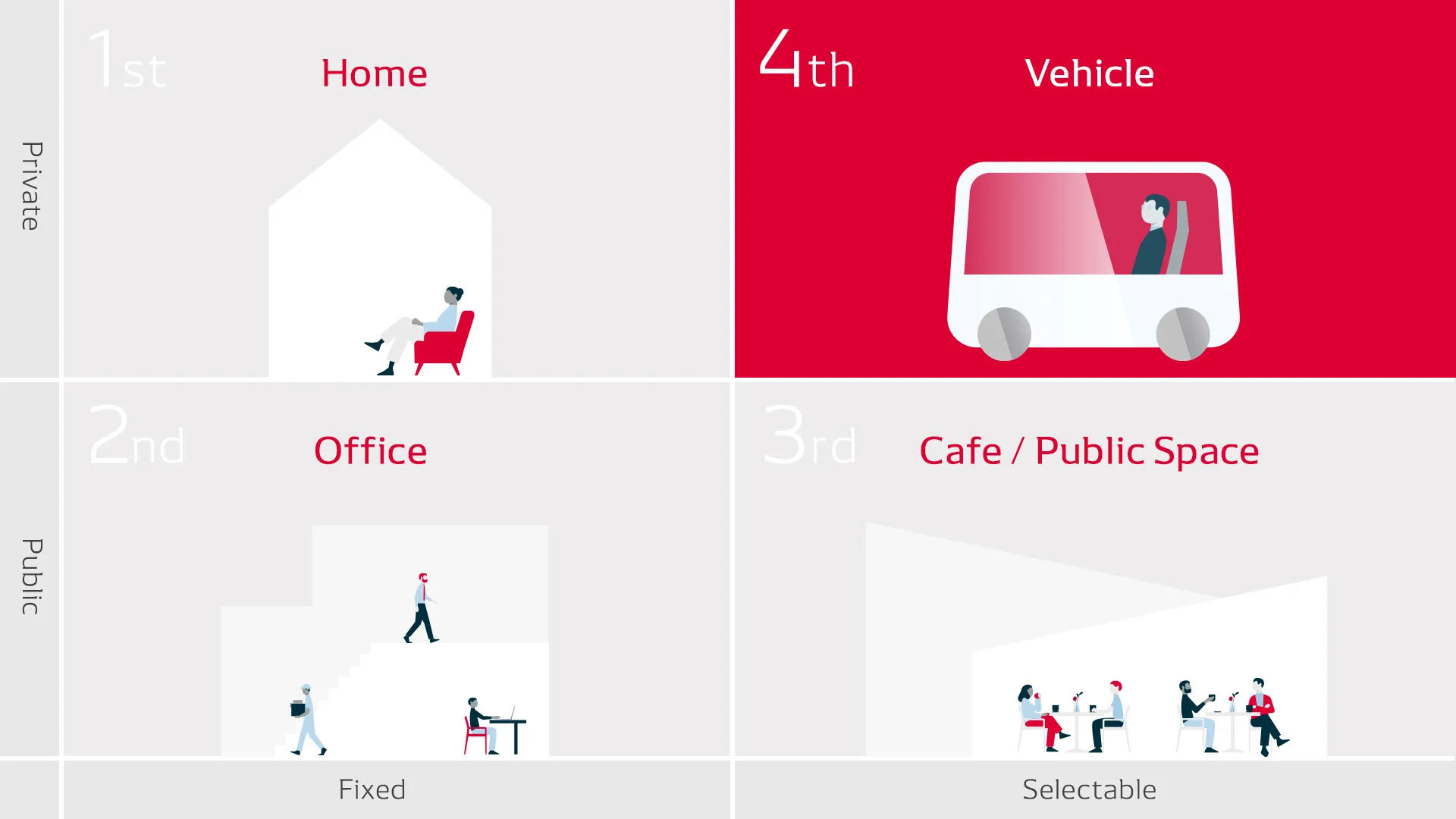
Rey Oldenburg, an American urban sociologist, referred to a comfortable space, which is neither one’s home nor office, as a "3rd Place". By this definition, one’s home would be the 1st Place, the office would be the 2nd Place, and cafes and parks would be considered 3rd Places. The 4th Place is defined as a space we occupy while traveling. Therefore, DENSO defines the car cabin as a 4th Place and strives to develop a variety of possible uses for it.
"If car cabins can become a 4th place that can change according to different purposes and deliver optimal experiences, our experience of mobility will evolve significantly," says Daichi Yagi, a member of DENSO’s Product Planning Office, which is engaged in the formulation of this concept.
"Social trends and needs are changing every moment, and the expectations of end-users will continue to diversify. With DENSO's sensor technology, we can recognize the status of each passenger as well as the environment inside the car and provide a comfortable interior space that fits perfectly with every purpose.
When stuck in a traffic jam, it would be possible to customize certain conditions inside the car depending on each passenger’s needs. For instance, it could prevent an accident by helping the person in the driver’s seat to stay awake while at the same time providing a relaxing experience for the person sitting in the passenger seat. This creates a unique and comfortable experience for each person inside the car. It may soon be possible to get some work done, play with your children, or rest as if you were in a luxury sleeper train, all while your car is in transit. With the evolution of automated driving technology, we may even begin to see cars differently, from a simple means of transport to a 4th Place with a purpose.
Three concepts for comfortable car cabins
There are three concepts that describe the conditions needed to realize a comfortable cabin as a 4th Place.
① Cleaning the air inside the car
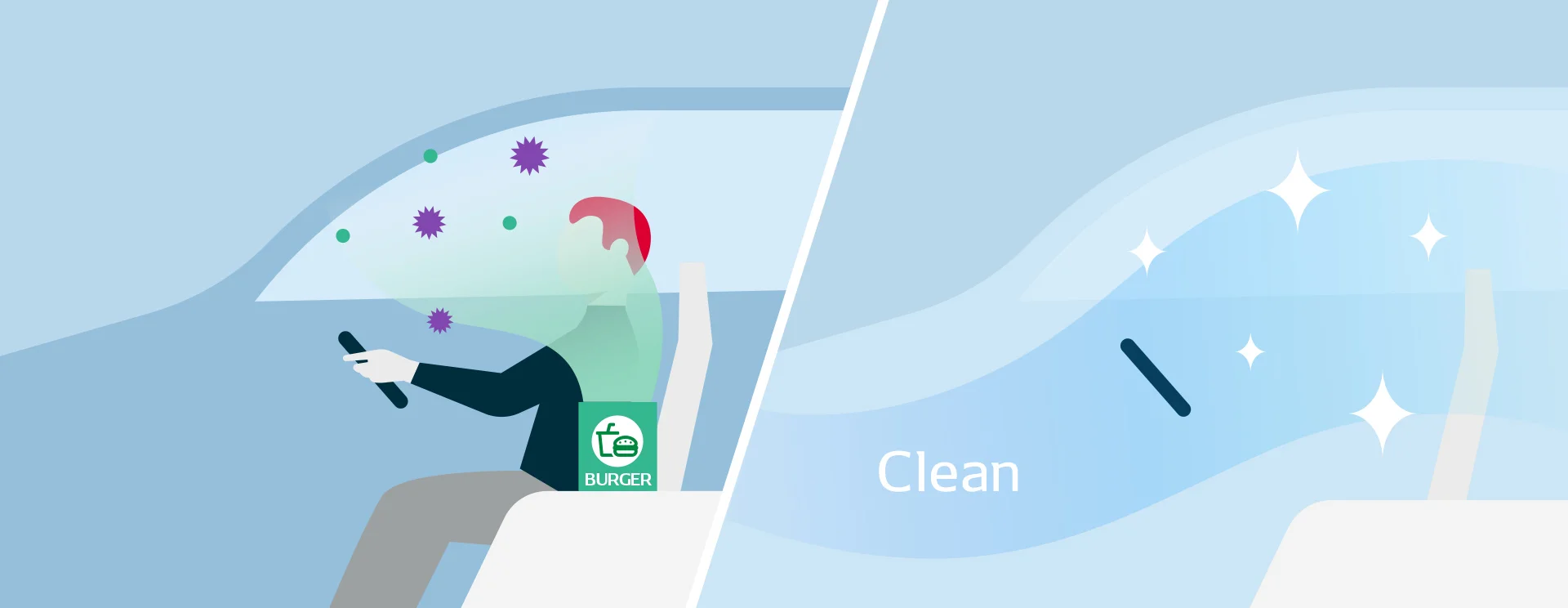
The first concept requires a means to clean the air inside the car, removing dust and viruses from the inside while preventing dust and pollen from coming into the cabin. Air filtration within a confined space was always a vital condition in ensuring a comfortable car cabin, but it is even more important today, given the need to minimize the risk of COVID-19 infection.
In China, India, the EU, and other countries, an Air Quality Index is used to measure the air’s cleanliness. In cities where air pollution is severe, for example, the reassurance of proper air filtration would be vital in making passengers feel at ease when traveling.
Air cleaning requires the installation of a cabin air filter into the air conditioning system (HVAC). However, the more easily the particles are captured, the more resistance the air takes to pass through, and the less efficient the air conditioning becomes. DENSO is enhancing its technology so that finer particles can be removed while keeping the resistance to venting as small as possible.
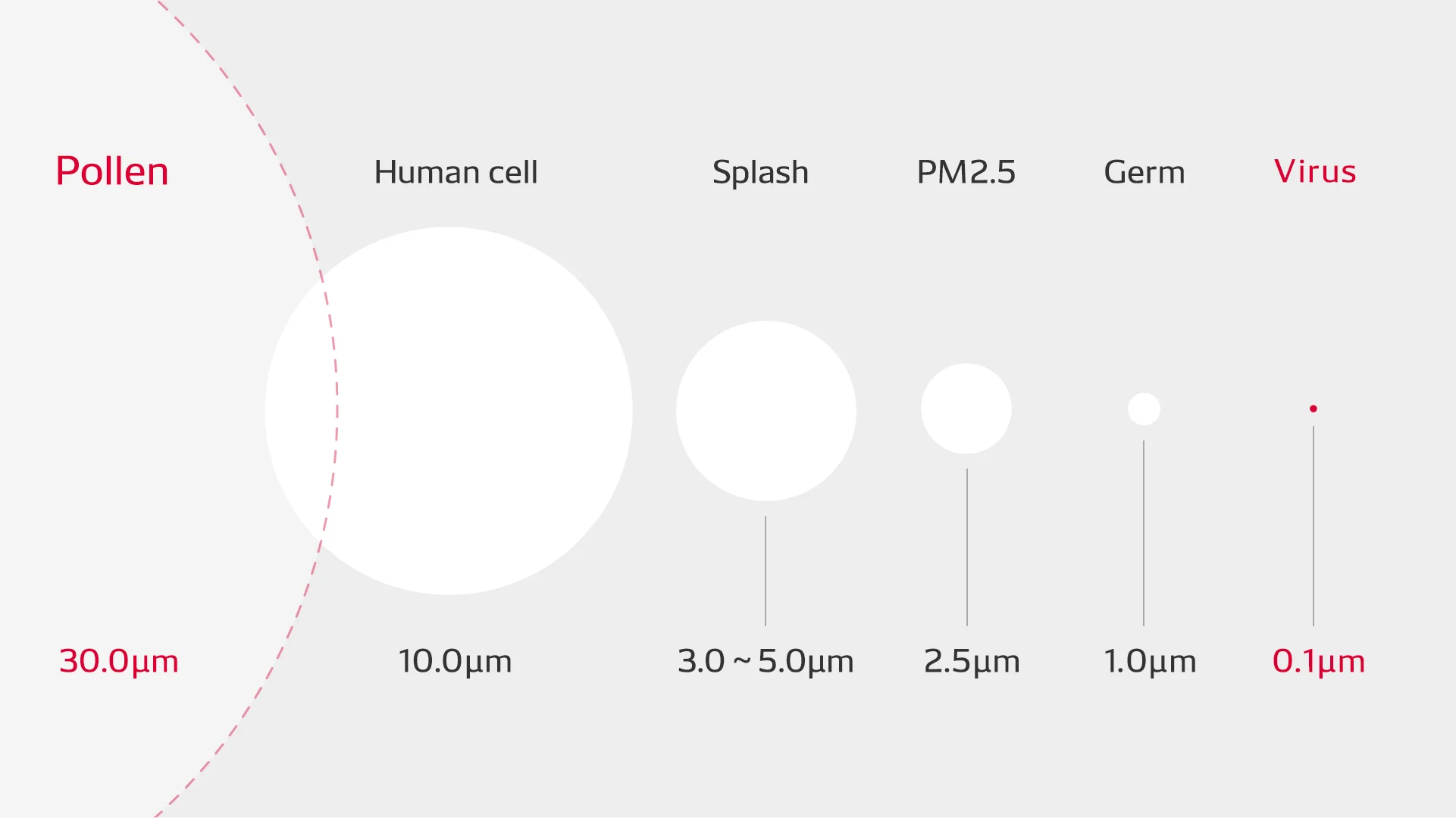
We are also working to develop a system that uses sensors to visualize the condition of the air inside the car. Air contamination is not visible. Therefore, we have started using sensors to detect fine particles and visualize the cleanliness of the air inside the car so that passengers are reassured that the cabin is kept clean and safe.

Akinori Kuwayama of the Air-Conditioning Engineering Division, involved in the development of solutions for air quality, shares his explanation on responding to diverse needs and his thoughts on the future cabin.
"Sadly, air pollution (PM/hazardous gas) results in the loss of as much as 4.2 million people's lives annually. As our mission as a company involves mobility development, we want to save lives through technological innovation. The first step is to realize a solution to remove fine particles and gases that cause health damage." (Kuwayama)
Since a car cabin is an enclosed space, odors may bother passengers. It is necessary, for example, to remove the smell of the food you brought in or the smell of pets. Especially in the case of ride sharing, odors can strongly affect the satisfaction of other users of the service. That is why we are developing technologies to meet a variety of needs, including filters with deodorizing functions to solve odor problems, as well as filters that emit vitamins that have a positive effect on passengers’ skin.
"By appropriately combining devices that match various needs, we will be able to adjust the air quality to meet passengers’ different needs. In the future, we hope to provide air that makes people healthier as they ride. We want to create such a space that helps to maintain the physical and mental health of passengers." (Kuwayama)
② Reducing drowsiness and fatigue
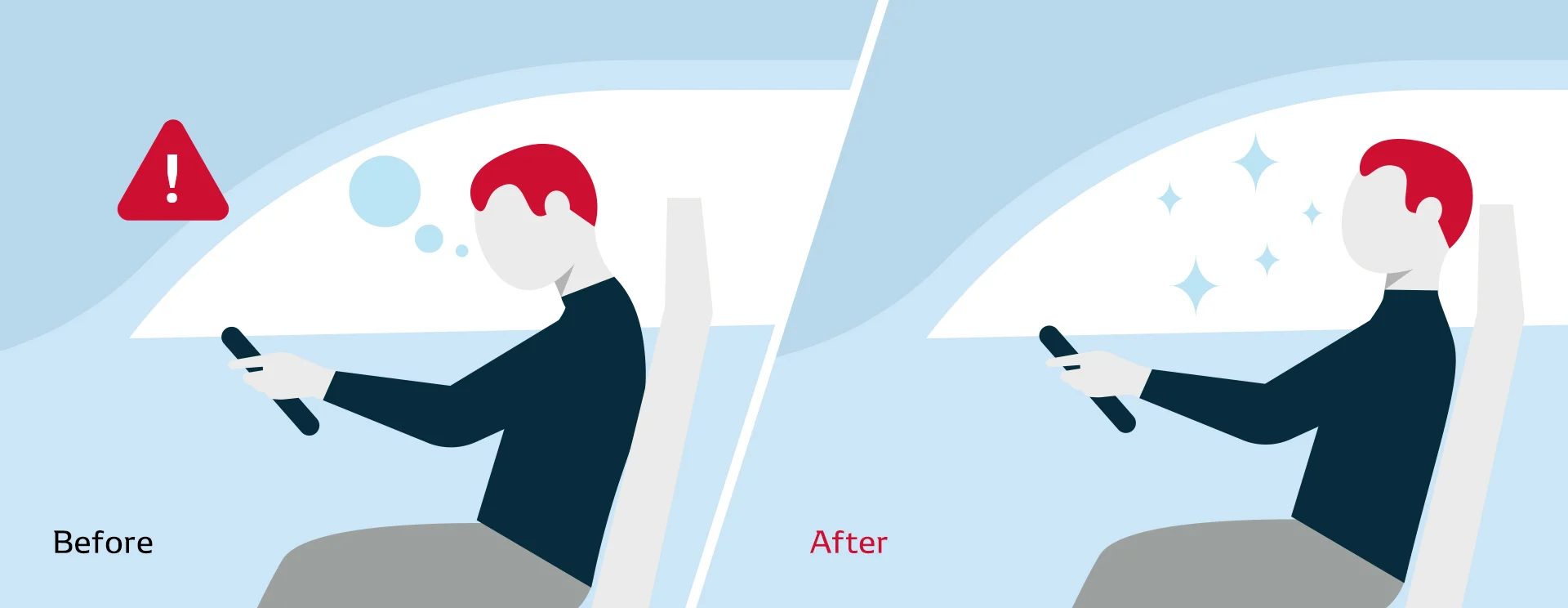
The second concept requires a way to “reduce drowsiness and fatigue”. Feeling sleepy and tired while driving can lead to accidents and is extremely dangerous. In order to realize a safe and comfortable cabin, there must be a way for the car to sense the driver’s status and use the air condition temperature to restore concentration or reduce the fatigue of the driver.
Takashi Matsuoka of Thermal Systems Advanced R&D Division and Yasuhiro Shimizu of Cockpit Systems R&D Division are involved in the development of solutions for this concept.
"Experiments so far have shown that when a driver is feeling severe drowsiness, even a loud sound like an alarm clock may fail to wake up the driver. Also, a sudden strong sound may be unpleasant to other passengers. Therefore, it is important is to detect drowsiness from an early stage to give various stimuli and deal with it before it becomes severe." (Matsuoka)
Parallel to reducing drowsiness, we are also focusing on reducing fatigue. Previous investigations and experiments have shown that passengers often feel fatigue from their shoulders to their waist.
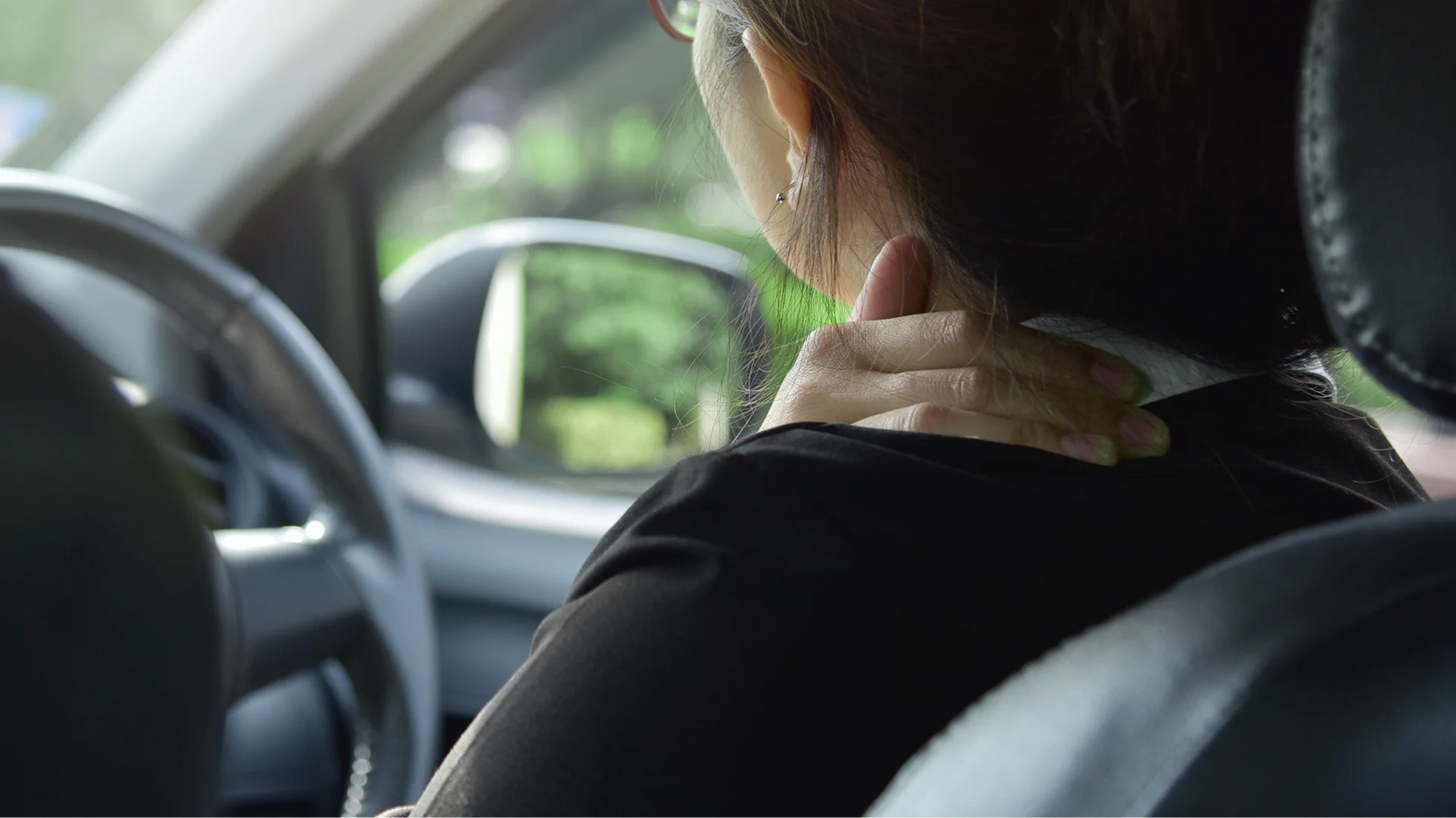
"What we have focused on is hydrotherapy using contrast water bath, which is usually applied in sports. The alternate use of hot and cold water improves blood circulation and muscular tension, and fixes stiffness. We are currently verifying the effect, simulating the contrast water bath through the alternate use of heating devices such as seat heaters and cooling devices such as seat ventilation. (Matsuoka)
"What we are studying is a technology to measure biomedical information to judge the driver's health condition. Using this technology, we can monitor the driver's brain condition, heart rate, or blood pressure without wearing a device. We are also thinking of providing functions such as running a health check from measured biological information, conducting a safe driving diagnosis, and encouraging the driver to take a rest." (Shimizu)
If you try to measure the state of your brain, heart rate, or blood pressure in your car, it is difficult to do so correctly because of the noise and vibration. Technologies that can accurately collect biometric information from passengers while the passengers are driving are unique to DENSO due to its expertise in sensing technology.
"In the future we would like to create a car cabin that allows passengers to sleep comfortably and feel refreshed, thereby contributing to passengers’ physical and mental well-being. In addition, we may be able to help the elderly by enabling them to drive while having brain training." (Shimizu)
③ Superimposing caution and seasonal information on the scene
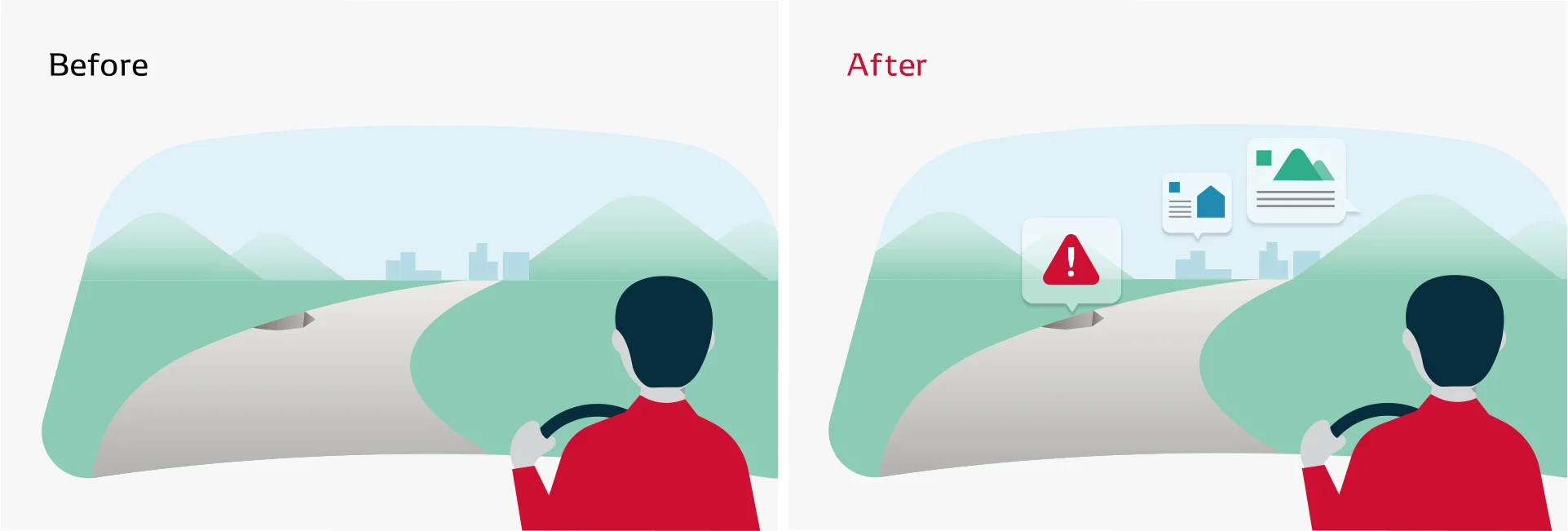
Finally, we introduce the concept of superimposing caution and seasonal information on the scene. The information previously displayed on the navigation display can be displayed on the windshield and superimposed over the scenery. Yuji Ota of Cockpit Systems R&D Division involved in the development, said it was difficult to develop a display function that provides information.
"Studies proved that drivers feel uncomfortable when the information display shifts due to car tilt or vibrations while driving. To pursue a display method that does not interfere with driving, research must be done to study the passenger's line of sight and vehicle behavior. The function that can correct the display according to the movement of the car while driving is only possible with the technology that DENSO has accumulated." (Ota)
Research on speech recognition and line-of-sight recognition for manipulating information displays is also essential for this solution. For example, if you say "move", the display will disappear or it will move to a place where it will not bother you. Information input and speech recognition technologies must also be enhanced to ensure that safety is not compromised.

"We are also developing an augmented reality head-up display (AR-HUD) function as a next-generation technology. In the future, even if the road is not visible due to fog, the curve shapes ahead can be displayed, and the vehicle-to-vehicle information communication function (V2V) will enable us to identify and display cave-ins on the road, etc. beforehand." (Ota)
There are problems in displaying information superimposed on the scene. In addition to complying with laws and regulations, these displays must be visible without problems even when exposed to direct sunlight, and they must be of a high quality that cannot be broken even in the hot sun. We are working with our partners, including semiconductor manufacturers, lens manufacturers, and glass manufacturers, to develop display systems with high performance.
If a display that functions in any environment is realized, the possibility of a mobility experience will be increased with new ideas.
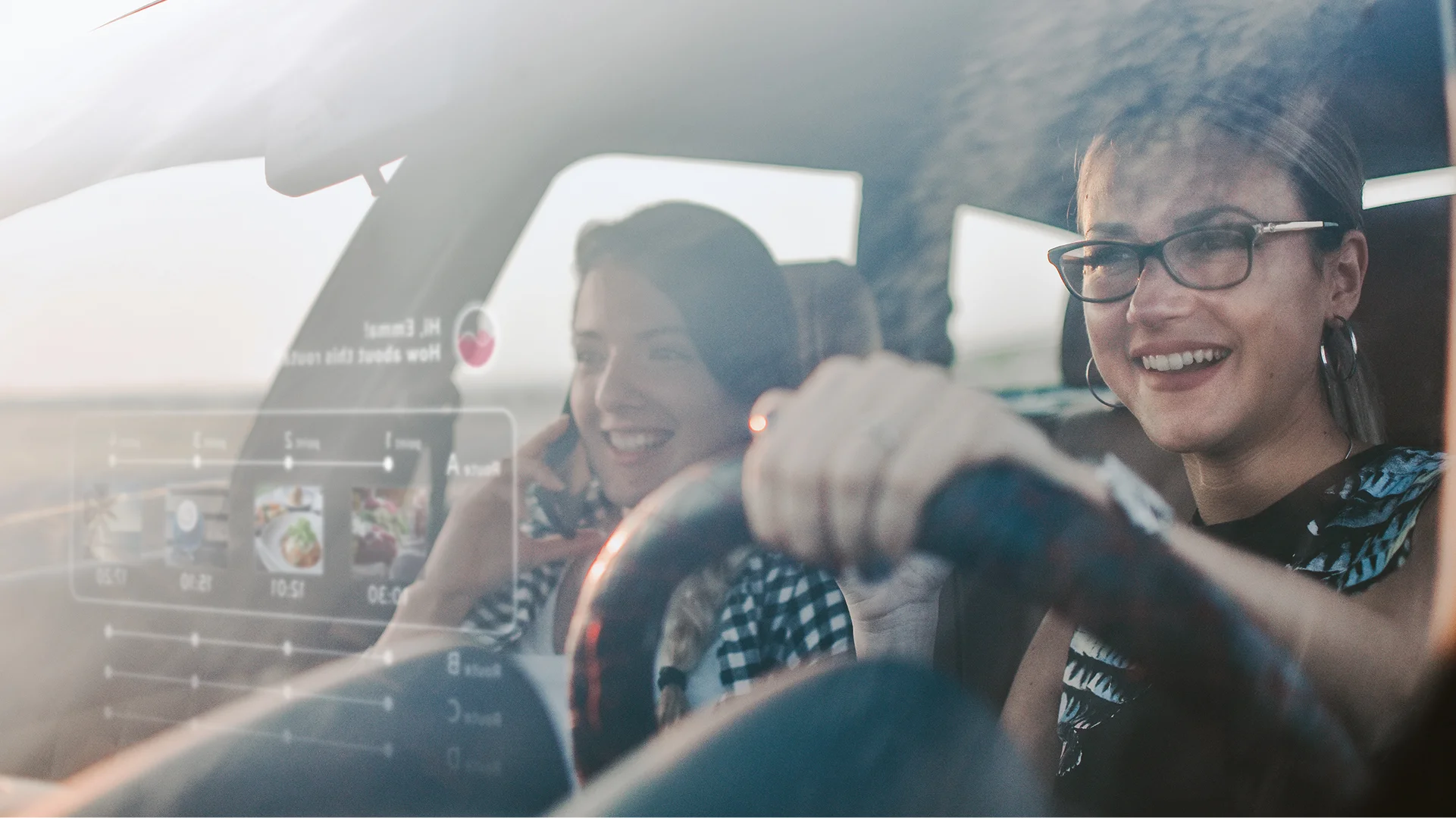
"For example, we can create "chance encounters" for passengers by providing information on local recommendations. For people who like to drive a car, we may be able to display a line on which professional drivers run so that driving can become more enjoyable. In addition, we believe that by displaying convenient information on side windows, etc. we can provide a new experience combining real mobility and virtual information." (Ota)
We will continue to work with our diverse partners to further enhance the value of vehicles as mobile spaces from a variety of perspectives.
Signs of the future we explore from extreme users
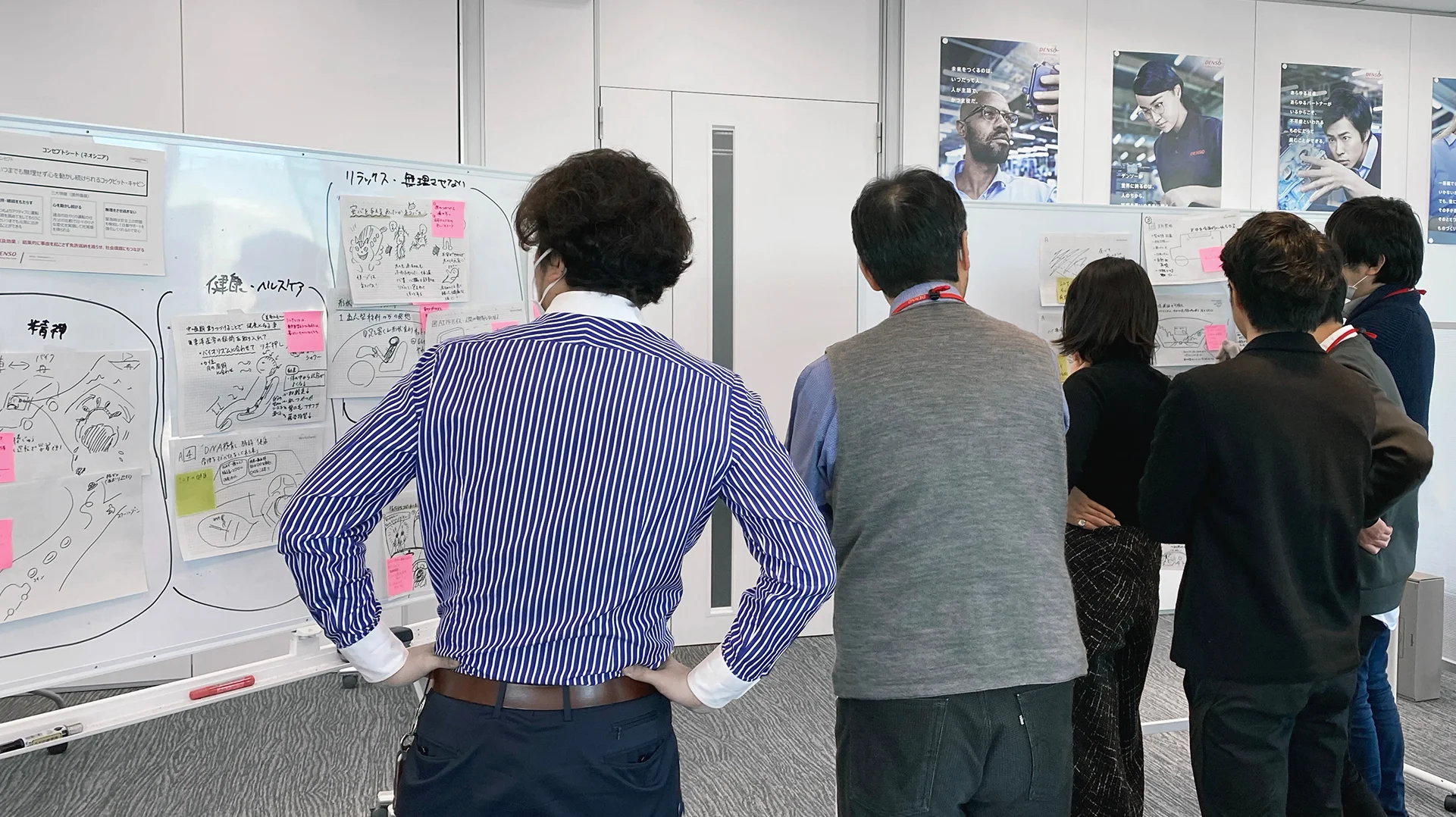
We emphasized the perspectives of end-user needs to bring together concepts that make 4th Place experiences more comfortable. We started our project by asking what kind of experiences passengers are looking for. Then, we reflected on the ideas we had come up with so far into the solution from a thorough end-user perspective.
"To deepen our 4th Place concept, market research alone is not enough. The important thing is to identify signs of the future and make hypotheses to verify it. To this end, we are focusing on edgy extreme users." (Yagi)
For example, we are interviewing users who live in multiple locations and those who incorporate new work styles. When we truly understand their needs, we can clearly identify very important signs and values of the future.
What technologies and solutions are needed to realize these in car cabins? We drew a journey map and proceeded with verification to find problems. Sometimes we actually created prototypes and asked for feedback from the end-users.
"In addition to our ability to respond appropriately to the demands of vehicle manufacturers, we will also be able to provide planning and proposals that will create value from the user's point of view. We hope that we will be able to gain more trust from our partners. (Yagi)
Strengths in developing solutions that transcend organizational boundaries
The concept of the user's viewpoint derived from "signs of the future" can demonstrate its value when it is actually implemented in our daily lives.
Shikata Kazushi of Cockpit Systems R&D Division says that our strength is that we can propose one-package solutions for realizing our concepts through a wide range of human resources and know-how.
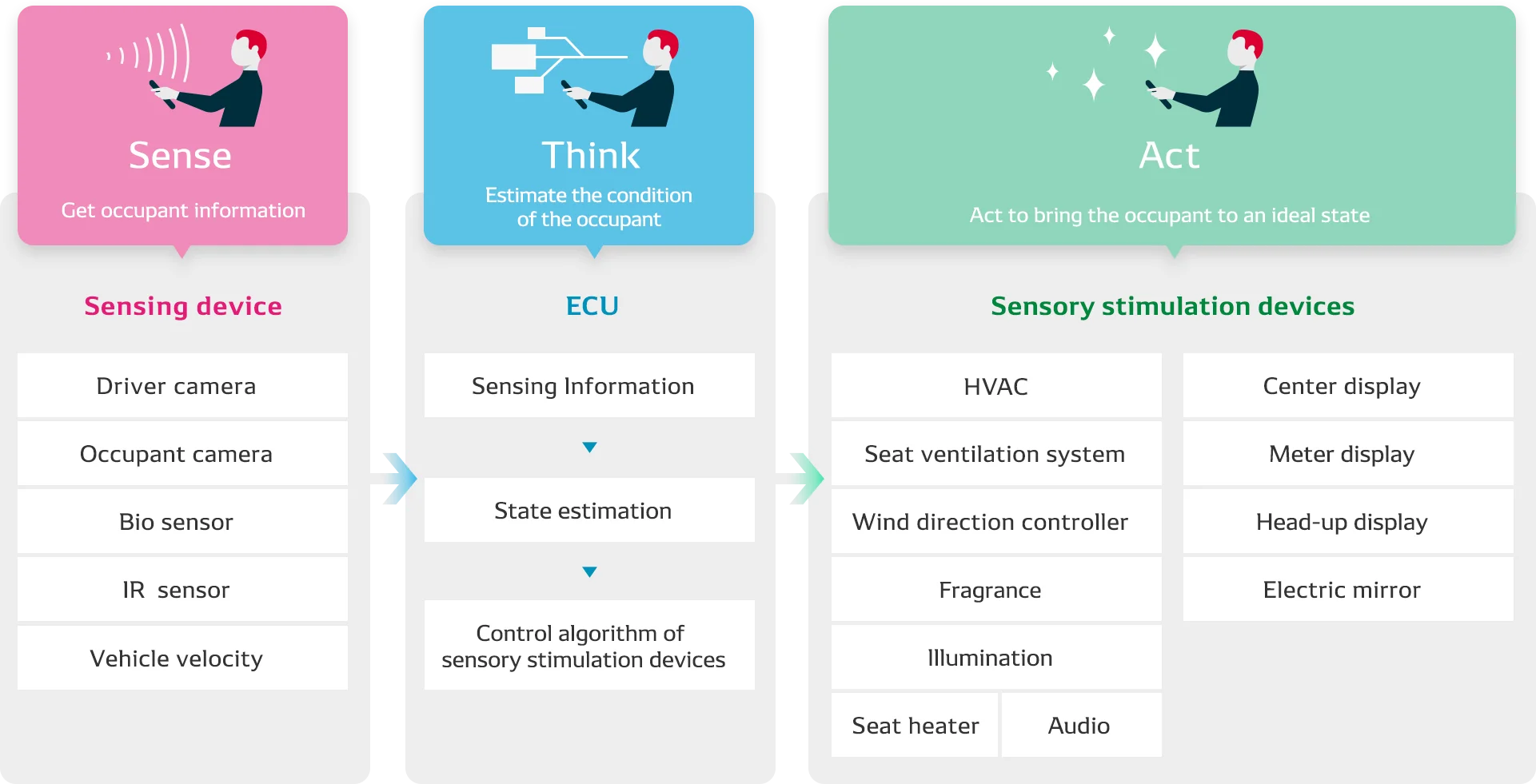
"DENSO has experts in a variety of fields." In addition, we also have technologies and know-how to realize a variety of functions, covering a wide range of areas related to cars.
That's why we are able to sense or perceive the passenger's status, judge how to correct it, and enable the device to change the environment, just like the three concepts we have presented.
In other words, we can develop a solution that makes the car cabin comfortable in a consistent way. "To further improve these strengths, we are advancing projects beyond organizational boundaries." (Shikata)
The future that Shikata envisions “provides a space that can separate people from daily life and support their well-being, where they can be their true selves." The possibility of 4th Place will expand by the number of human needs.
Creating value for end users in the future
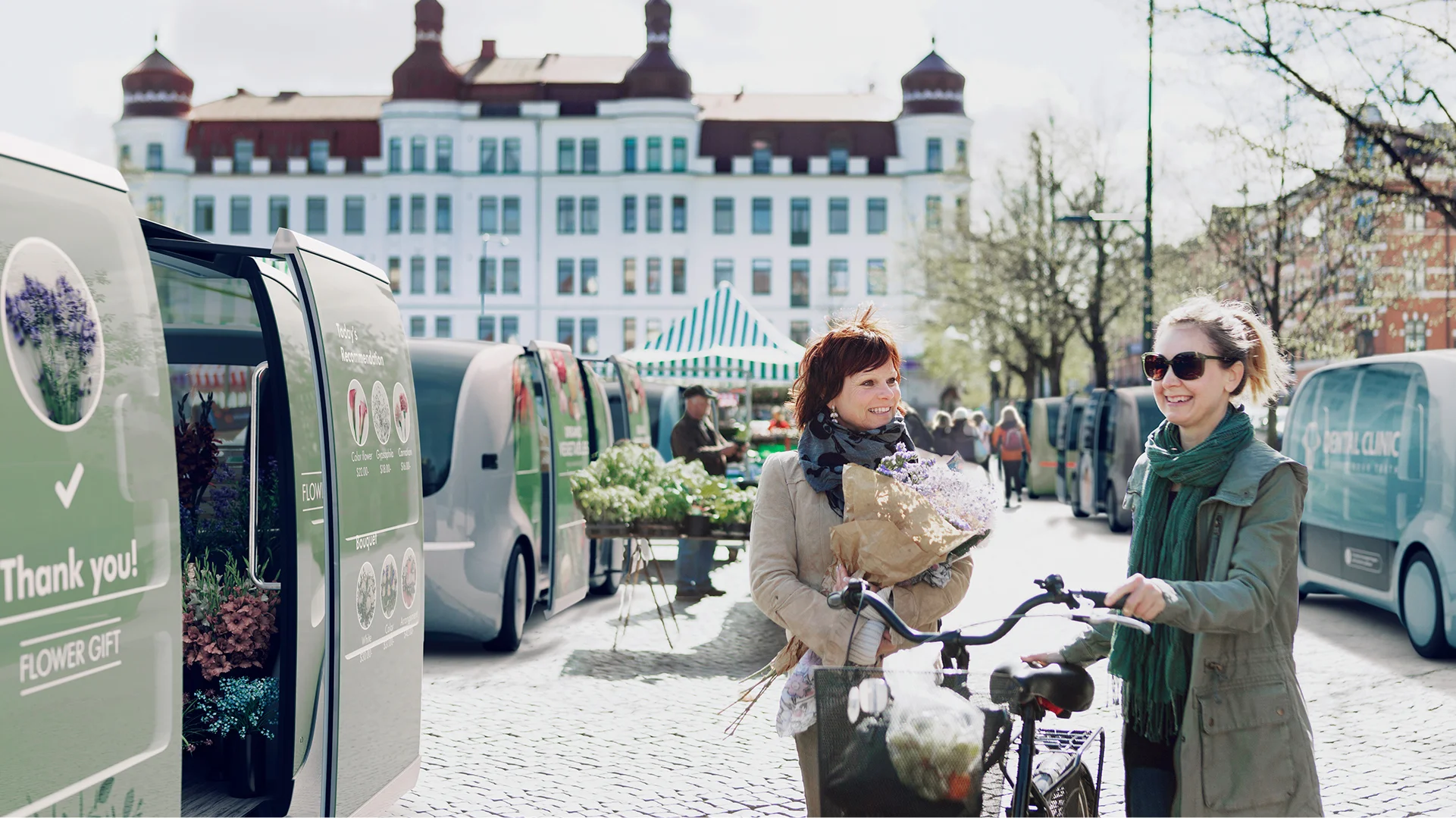
If we redefine a car as a 4th Place, the possibilities created by mobility spaces can be infinite. Just as there are many purposes to go to a cafe, the purpose of riding a car will be diverse, not just for transportation. What kind of experience would you like to have in a car, a space with unlimited possibilities?
We are working on what we believe will be necessary in the future by anticipating emerging needs. Therefore, when we hear people saying, "We wish we could experience this kind of thing", we will be able to say, "We already have the solution to realize that". DENSO will create a 4th Place that can fulfill the infinite ideas.
COMMENT
Changing your "Cant's" into "Cans"
Where Knowledge and People Gather.



